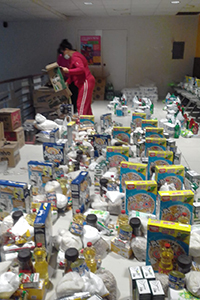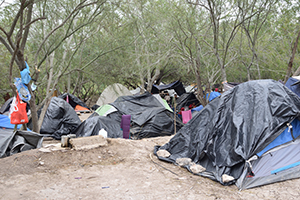By LISA EISENHAUER
After months of discernment and discussion, the Sisters of Charity of the Incarnate Word, San Antonio, distilled their vision for the future in five words:
Human dignity knows no borders.
They had developed a multipronged plan in which the sisters serve as connectors and conduits for their partners and missions in the United States, Mexico and Peru. Playing a vital role is CHRISTUS Health system, of which the congregation is a founder and sponsor.

A woman and children living in a refugee camp in Matamoros, Mexico, wear masks created through the efforts of the Sisters of Charity of the Incarnate Word, San Antonio. Earlier this year the congregation’s Matamoros Mask Project delivered 1,064 masks to a tent city where asylum seekers wait for U.S. immigration rulings on their petitions.
"The intent was to provide the congregation with action lines moving forward," said Sr. Adriana Calzada Vazquez, CCVI. "We think of it not as a new program but as a way to invite our partners to collaborate in a more intentional way."
The future became now in March, when COVID-19 threatened both sides of the border. The sisters activated members of their network to address the immediate needs of the migrants they serve by supplying emergency essentials.
A new path forward
The congregation started the process of refocusing its response to immigrants in the shadow of Migration Protection Protocols from the U.S. Department of Homeland Security. Announced early in 2019, the protocols forced most migrants seeking asylum to be returned to Mexico during their lengthy immigration proceedings, rendering several of the sisters' missions in San Antonio less effective. Among them was an Interfaith Coalition program centered at the bus terminal, where the sisters and others would offer assistance.
Instead, asylum seekers from Central America who had been returned to Mexico flocked to a swelling tent city south of the border in Matamoros. Given that the situation in San Antonio mirrored the entire border and that the congregation had more than two dozen partners throughout Mexico, Peru and the U.S., the sisters decided to take a comprehensive look at how best to redeploy their resources.
"We realize that we have a lot of friends and ministries associated with us," said Sr. Calzada. "We wanted to look at how we could expand our reach as a ministry."
The sisters gathered about two dozen representatives from their partners and ministries, recruited equally from both sides of the border. The group, which included CHRISTUS Health, met from August through November, then set up a smaller Migration Task Force to initiate its Migration Crisis Call-to-Action Plan to address four areas:
- Education: Promoting an accurate and historical perspective of the global migration crisis. Their key partners include University of the Incarnate Word in San Antonio and Universidad de Monterrey, both of which the congregation founded.
- Health and Families: Providing for the basic needs of individuals and families along the migration pathway as well as upon arrival. CHRISTUS Health along with the universities and health care professionals will provide medical supplies and services.
- Communication and Media: Developing tools on multiple platforms to share information about the migration crisis. This includes using the skill set of marketing and communication professionals from CHRISTUS Health and CHRISTUS Muguerza, the system's Mexico region.
- Legal Processes: Representing and advocating for just practices and resources for migrants and refugees through legislation and the courts.
Members of the task force presented the call to action at the congregation's annual assembly in February, but the big picture and event horizon shortened a month later with the growing threat of COVID-19 and related changes to asylum protocols. As Catholic Health World went to press, asylum hearings have been suspended until at least mid-July, and migrants wait through the summer heat in the crowded camps. Border closings and social distancing have further limited the sisters' ability to provide goods and services in person.
Nimble response
"Our thoughts turned to the refugee camp in Matamoros and what would happen when, rather than if, COVID hit the camp," said Sr. Jean Durel, CCVI. "We asked, 'What can we do?'"
The answer was to move quickly and nimbly through their ministries and network of partners to fill the short-term needs of camps all along the border.

Nonperishable food purchased in part through a donation from the Sisters of Charity of the Incarnate Word is sorted for delivery to an encampment in Ciudad Juarez, where asylum seekers wait for immigration hearings to resume in El Paso, Texas.
With running water a precious commodity in the camp, Sr. Durel called on several partners in search of scarce hand sanitizer. Though her connections were unable to help, she was impressed with their willingness, and the camp eventually secured a source through another agency.
Global Response Management, which built a field hospital to handle COVID-19 cases at the camp, also issued a plea to Sr. Durel for face masks, two for each refugee in the camp. Sr. Calzada, vice president of mission and ministry at the congregation's University of the Incarnate Word, spread the call. The school's theater department answered; the costume shop took the pattern supplied by the congregation from Mexico and made more than 1,000 masks. Members and partners of the congregation from as far away as St. Louis also contributed to the project.
Having received a request from Sr. Cecilia Zavala, CCVI, the sisters helped to provide money for food at a similar camp in Ciudad Juarez, opposite the border at El Paso, Texas.
"Those were small things," Sr. Durel said. "But the need was immediate, and it was amazing to see the network move so quickly to fill the needs."
Encouraging news from the Matamoros camp followed. As of mid-May, the field hospital remained empty. Though about 20 residents had been tested, none received a positive result. But on June 30, TIME magazine reported that a woman in the Matamoros camp had tested positive for coronavirus.
Conduits, connectors
Sr. Calzada said it's frustrating not to be able to do direct outreach with immigrants because of the coronavirus contagion risk. "When we are talking about our migrant brothers, we want to be out there. But I live with at-risk people, so it's been difficult to accept my role. It's more like a desk job, which sounds inconsistent with what our mission among the migrants normally is."
But the congregation's rapid response to the immediate needs of the camps proved the effectiveness of elements of its long-term plan.

Plastic tarps used to winterize tents of migrants in Matamoros, Mexico. The tent city is inhabited by people waiting for asylum hearings held across the border in Texas. The proceedings have been paused since early this year.
"So, we can see our role becomes being connectors," Sr. Calzada said, "bringing people together, inviting people to be part of this, talking to each other about how to achieve the small goals as well as the big ones in our call to action. In one sense, there's not a lot to report, but moving forward is where our hopes are."
Among the longer-term goals that excite the sisters is a program in which students majoring in health professions and education at the congregation's universities on both sides of the border partner with staff from CHRISTUS Health to address the needs of migrants throughout their journey.
"An immersion experience like this is one of the exciting projects to look forward to," Sr. Calzada said. "That can only be done because CHRISTUS has a presence on both sides of the border."
From their growing network of contacts, the sisters seem to embrace the role of go-betweens and conduits, breaking down borders between people who need services and those who offer them.
"There's so much going on at the border, and the people willing to help on this side stretch from Washington, D.C., to Grand Rapids, Michigan, to St. Louis and Jefferson City, Missouri," Sr. Durel said. "Even today, I added to my list because we continue to become aware of people who are not only collaborators but true partners."